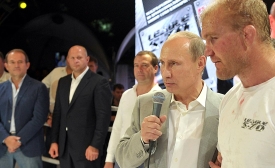russia

Markos Kounalakis on avoiding a "Putinocracy" in the United States.
Lithuanian troops are teaching their British counterparts how to identify and fight Russia propaganda as part of an ongoing attempt to fight the country’s attempts to influence public opinion. Officers from the Baltic state – which is said to be at the front line of Russia’s “soft power” war in Europe – shared their experiences with the 77th Brigade, a new British Army unit set up to deal with information warfare.
The tour, marked as the teaser of the " China-Russia Internet Media Forum" that will be heldin Tianhe district on Saturday, included visits to some of the leading internet and innovativecompanies in the district. More than twenty Russian press savvies and media entrepreneurswith their Chinese counterparts attended the tour.
America’s historical quest for freedom and democracy has been all but stamped out under the Obama administration in its quest to weaken American power, hard or soft. During Soviet times, Radio Free Europe and other Western media outlets did a good job of telling the world [...] We need to restore this vision and capability with similar, modern media efforts around the globe to tell the American story.
Because of the United States’ predominant role in geopolitics and global economics, foreign governments and their citizens scrutinize the candidates and their positions, which can hint at future American policies. The campaign also acts as a snapshot of American democracy. According to political scientist Joseph Nye, America’s soft power – its ability to persuade foreign leaders and exert influence abroad – partly depends on how the rest of world interprets our political process, values and outcomes.
Call it “cultural diplomacy” or “soft power,” the blockbuster show was just one half of the major Russian cultural initiatives that debuted in Paris during the week, seeking to burnish Moscow’s reputation abroad as a year dedicated to “cultural tourism” has been overshadowed by political disputes.







